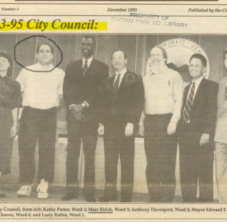This is part one of an investigative series on the origins of several immigration movements, associated non-profits / NGOs and geopolitical events a world away that have shaped Montgomery County, Maryland into the community it is today. It is also a unique look back at some of the international escapades and adventures of local MoCo politicians – including current County Executive Marc Elrich.
The “Power of Democracy”
The Country of El Salvador has a rich and complex history – and its relationship with Montgomery County, Maryland is also nuanced and hard to distill into a single short piece. Partly based on ideological goals and a desire to be against whatever U.S. President Ronald Reagan was “for”, but also based on a human rights campaign for truly oppressed people a world away, the relationship between Montgomery County residents and this small Central American nation goes back 40+ years. Investigating its origins takes some digging.
It all began with an organization called “New El Salvador Today”.
In November 1990, The Washington Post’s Carlos Sanchez wrote “Throwing a Lifeline to a Sister City” to highlight the “unusual relationship” that developed between Takoma Park, MD and Santa Marta, a village (Comunidad) in northern El Salvador that is close to the border with Honduras. Nearby Santa Marta, in November of 1981, unarmed Salvadorian refugees were slaughtered trying to cross a river (Rio Lempa) to get into neighboring Honduras. The refugees were running away from the ongoing civil conflict present in northern El Salvador that pitted anti-communist government paramilitary forces against left wing-ish revolutionaries and (some) communist-affiliated guerillas.
Sanchez wrote:
But my research shows that “New El Salvador Today” was not a New York organization nor was it a run-of-the-mill advocacy group. “New El Salvador Today” (NEST) was actually a San Francisco-based organization that had started up in the early 1980s and was seeking allies in its campaign against United States federal aid to the government of El Salvador. NEST saw the small city of Takoma Park, Maryland, as the perfect place to establish another partnership. Why? The presence of lefty radicals like Marc Elrich and others, who at least had a bit of local influence through the small, DC-adjacent city. NEST fit in nicely with the overall communication and fundraising plans of the “Committee in Solidarity with the People of El Salvador” (CISPES):
The above is excerpted from the dissertation of one Dr. Ricardo J Valencia at the University of Oregon (2018) entitled: The Making of the White Middle-Class Radical: A Discourse Analysis of the Public Relations of the Committee in Solidarity with the People of El Salvador between 1980 and 1990. Mr. Valencia was also a communication counselor to the Embassy of El Salvador to the United States from 2010 until 2014.
Mr. Valencia’s research further indicated (below) that NEST was part of a broader consortium of non-profits seeking influence abroad and in the United States.
And influence local politicians in MoCo, NEST certainly did.
In addition to the resolution passed by Takoma Park City Council in 1988 establishing sister city ties, the passion for El Salvadorian lefty revolutionaries and ‘democracy fighters’ was so great that Mr. Marc Elrich traveled to a literal war zone, presumably on his own dime, to try and visit people (again, per Carlos Sanchez reporting for The Washington Post):
This is real passion for a cause, and one has to at least admire Mr. Elrich for the attempt made. How many Montgomery County politicians today would travel to Yemen, to Ukraine, to Ethiopia or even to Armenia on their own dime to try and stand up for the democratic rights of oppressed people or minorities in break-away enclaves or exclaves?
Of the many current performative “activists” and astro-turf, taxpayer-supported non-profits that try to make a small stir on some issue in MoCo today, how many would be so authentic and fly halfway across the world to help the actually oppressed?
The image of a younger Marc Elrich sweating through khakis and trekking through thick jungle in an attempt to reach a remote village in northern El Salvador to explain Takoma Park’s lefty “solidarity” with the people of a village does make for an interesting visual.
They don’t make local political activists and anti-developer agitators – left, right, or in-between – like this anymore.
More to come in Part Two.







